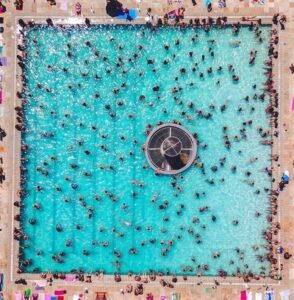Many people have heard about macular degeneration but aren’t sure what the disease means until it affects a loved one, or themselves. It’s important to know about macular degeneration—referred to as Age-Related Macular Degeneration or AMD by eye doctors— because it affects nearly 2 million Americans and is a leading cause of vision loss in the U.S. 
Vision loss caused by AMD is unusual in that it’s your central vision that’s damaged, meaning that anything you look at directly is blurry. This vision loss occurs whether the object you’re looking at is near or far, which affects your ability to read, drive, and do many other routine daily activities.
Macular degeneration is a chronic and progressive disease, and symptoms of vision loss are typically not noticeable until the later stages of the disease. As a result, regular comprehensive eye exams are essential to detect AMD early enough that treatment may slow the progression of the disease.
The amount of damage to your vision and potential treatments depend on the type of AMD you have—dry or wet.
Dry Vs. Wet AMD—What’s The Difference?
Approximately 80% of people with AMD have what’s known as dry macular degeneration. Dry AMD develops when parts of the macula get thinner with age and tiny clumps of protein form on the macula. Currently, there is no known treatment for dry AMD, although your eye doctor will have recommendations that can help slow the progression of the disease.
The much less common but more serious form of macular degeneration is called wet macular degeneration. Wet AMD occurs when abnormal blood vessels grow under the retina. These blood vessels may leak, causing scarring of the macula. Vision loss occurs more quickly with wet AMD than with dry AMD.
Causes & Treatments Of Dry & Wet AMD
Macular degeneration—whether dry or wet—is largely related to aging, thus the term age-related macular degeneration, but family history is also a leading risk factor. Your risk of developing AMD increases if you:
- Have a family history of macular degeneration
- Are over age 50
- Smoke cigarettes
- Are overweight
- Have high cholesterol
- Have high blood pressure
- Are diabetic
- Are Caucasian
In most cases, damage and vision loss caused by AMD is not reversible, although wet AMD may be treated with medications called anti-VEGF drugs or with laser procedures. Genetic testing is also now available to help identify those who are most likely to develop “wet” macular degeneration.
For patients with dry macular degeneration, Dr. Thompson at Hardin Valley Eyecare & Optical recommends AREDS eye vitamins.
In either case of dry or wet AMD there are steps your eye doctor can recommend to slow the progression of the disease, including:
- Specific eye supplements, such as AREDS eye vitamins
- Quitting smoking
- Proper eye protection from sunlight
- Eating a balanced diet
- Maintaining healthy cholesterol and blood pressure levels
- Keeping diabetes under control
The most important factor to slowing vision loss from dry or wet macular degeneration is to have the disease diagnosed as early as possible. If you have blurry vision, have a family history of macular degeneration, are over age 50, or have any of the other risk factors listed above, be sure to schedule regular eye exams with a qualified eye doctor.
Hardin Valley Eyecare & Optical has the experience and expertise to diagnose and often treat eye diseases like dry or wet macular degeneration. Our eye care professionals are dedicated to providing exceptional personal service to each and every person who walks through our door. Stop by our practice at 10904 Spring Bluff Way off Hardin Valley Road, call us at (865) 409-1253, or contact us to request an appointment.





